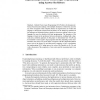Free Online Productivity Tools
i2Speak
i2Symbol
i2OCR
iTex2Img
iWeb2Print
iWeb2Shot
i2Type
iPdf2Split
iPdf2Merge
i2Bopomofo
i2Arabic
i2Style
i2Image
i2PDF
iLatex2Rtf
Sci2ools
118
click to vote
FOIKS
2004
Springer
2004
Springer
Implementing Ordered Choice Logic Programming using Answer Set Solvers
Abstract. Ordered Choice Logic Programming (OCLP) allows for dynamic preference-based decision-making with multiple alternatives without the need for any form of negation. This complete absence of negation does not weaken the language as both forms (classical and as-failure) can be intuitively simulated in the language and eliminated using a simple pre-processor, making it also an easy language for users less familiar with logic programming. The semantics of the language is based on the preference between alternatives, yielding both a skeptical and a credulous approach. In this paper we demonstrate how OCLPs can be translated to semi-negative logic programs such that, depending on the transformation, the answer sets of the latter correspond with the skeptical/credulous answer sets of the former. By providing such a mapping, we have a mechanism for implementing OCLP using answer set solvers like Smodels or dlv. We end with a discussion of the complexity of our system and the reasoning t...
Related Content
| Added | 01 Jul 2010 |
| Updated | 01 Jul 2010 |
| Type | Conference |
| Year | 2004 |
| Where | FOIKS |
| Authors | Marina De Vos |
Comments (0)

